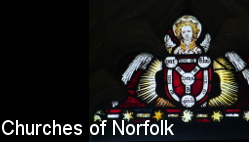
home I index I latest I glossary I introductions I e-mail I about this site
St Mary, Ashby St Mary
Follow these journeys as they happen at Last Of England Twitter.
| St Mary,
Ashby St Mary After the wilds of the marshland with its lonely little churches, Ashby St Mary is a comfortable sort of place, its church sitting on the village street. Form the west, the 15th Century tower appears taller than the Norman church below it is long, each accentuating the proportions of the other. A memorial stone set in the south wall of the nave tells us that Thomas Badley departed this life the seaventh day of August in the yeare of our Lord God 1697 aged 40 yeare, the conventional skull and fronds at the top given dignity by the setting within a line of red brick. Stepping into the porch reveals the surprise of a magnificent Norman south doorway, likely the work of the same master mason as at nearby Heckingham. Norman doorways are common in this part of Norfolk, but these are the two obest of them I think. The windows of the Norman nave you step into were replaced with Perpendicular ones in the late medieval period, and how dark the interior must have been before this happened. From outside the nave and chancel are continuous under one roof, but inside the chancel is dignified by a wagon roof. The font is a curiosity, for as at neighbouring Thurton it appears to be of the late 17th Century, perhaps a replacement for an earlier font that was removed from the church during the Civil War and Commonwealth. Oddly, the apparently Jacobean font cover is a 19th Century replacement, and in general the Victorians were busy here wih tiled floors and dark woodwork. They also replaced the east window in the chancel with a smaller one (you can still make out the jambs of the earlier one) so they may have detected a structural weakness there. The 1860s glass they left is unexciting, one of hundreds of reproductions of Holman Hunt's The Light of the World that appeared in churches in the last decades of that century, perhaps the work of Ward & Hughes. More interestingly, a collected 17th roundel is a Flemish marriage glass, an angel holding shields depicting the crests of the two families and the inscription Deus Ambo 1604 ('God has joined, 1604') underneath. Another married couple are remembered outside in the churchyard at the other end of their journey together. George and Ann Basey are buried side by side as you might expect, but unusually the reliefs on their 1860s headstones depict the division of labour on their farm, George feeding his turkeys and Ann her geese, a lovely thing to find. Simon Knott, December 2022 Follow these journeys as they happen at Last Of England Twitter. |
|
|||||||||||||||||||||||||||||||||||||||||||||||||||||||
home I index I latest I introductions I e-mail I about this site I glossary
links I small
print I www.simonknott.co.uk I www.suffolkchurches.co.uk
ruined churches I desktop backgrounds I round tower churches